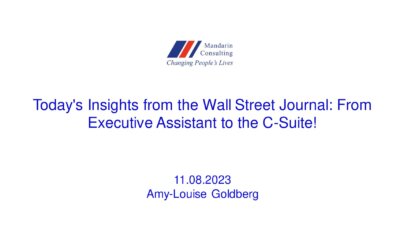08.11.2023 Today’s Insights from the Wall Street Journal: From Executive Assistant to the C-Suite!

Dear Students,
More than a few members of our global coaching team have heard candidates (perhaps even one of your friends?) lament that they’ve “only received a low-level” job offer, which they hesitate to accept, concluding that it probably won’t lead to a bigger role, won’t “sell them” into a more prominent company or even enable them earn much more money down the road.
Yet, as this article in today’s Wall Street Journal shows, “starting small” can yield “big results.” Okay, you may be thinking, But, what does it take for this to occur? Unsurprisingly, it requires many of the “Western” competencies we emphasize in our coaching program, including curiosity, initiative, communication skills (written and verbal), and courage (willingness to take risks) regarding your beliefs, along with keen powers of observation and great listening skills.
While starting “at the bottom” may seem unglamorous, the piece points out that “About 1% of Executive Assistants (EAs) do eventually become C-Suite executives, while an additional 10% go into some sort of management role.”
|
It’s not just in the movies. Some executive assistants do turn their jobs into a launchpad to the top.
|
The keys to such advancement involve a combination of ambition and opportunism, focus and timing, seeking out ways to contribute added value and demonstrating the confidence to share your POV (point of view) whenever you can do so, through offering an innovative idea or useful perspective. These opportunities are, of course, much more likely to happen when a new grad, like you, adopts an agile, continuous-learning mindset.
Never say never.
Using WSJ Features Writer Anne Marie Chaker’s Personal Journal column as a conversation-starter, our Mandarin Consulting coaches would like to help candidates like you to regard every single step in your career – even the “unsexy side of the business” as cited in the article – as a learning and developmental opportunity. As ambitious international students raised in a culture with more professionally-passive expectations for young people, aspiring talent like you and your peers need to understand that “waiting to be asked” to demonstrate your leadership, analytical, critical thinking and other key “power” skills is not what is rewarded in a global company. There are, as our coaches know, possibilities for young professionals like you to distinguish yourself at every turn, if you only seek them out.
